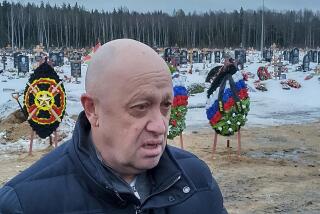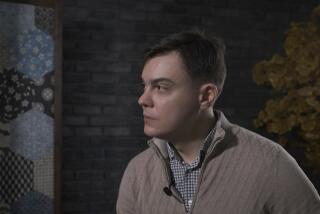Yeltsin Pleads for Return but Is Rebuffed
- Share via
MOSCOW — Boris N. Yeltsin, fired last fall as the Communist Party leader of Moscow for his radical populist style, dramatically appealed Friday to the special party conference here for his political rehabilitation.
But the unrepentant Yeltsin, who said his only sin was untimely criticism of party conservatives, was strongly rebuffed by both Soviet leader Mikhail S. Gorbachev and the party’s No. 2 man in a Kremlin showdown on the course of the country’s political and economic reforms.
In a speech broadcast later to the nation, Yeltsin asked the 5,000 delegates to “rehabilitate me in the eyes of the Communists.” He argued that his warnings that party conservatives were weakening the reform program had been proven correct and that the original goals had been seriously compromised.
“I believe my only error was to speak up at the wrong time,” he said in an emotional plea that recalled his controversial ouster from the key Moscow post and his later demotion from the party’s ruling Politburo.
With his go-to-the-people style, so unusual for the Soviet Union, Yeltsin also was seeking mass approval for his demands for bolder party reforms and fewer compromises.
“I ask the conference to pronounce on my political rehabilitation,” he said. “I regard this as a question of principle.”
Rejected by Gorbachev
But the prospect of any return by Yeltsin, 57, received a hard, unequivocal “no” from Gorbachev, who attacked him not only for his position on reform but also for the way he repeatedly purged the Moscow party’s cadres.
At the same time, Yeltsin also was rejected by Yegor K. Ligachev, the party’s chief ideologist and second-ranking official, who in the popular image of the party symbolizes its conservatives, just as Yeltsin has symbolized the radicals.
“I see no grounds for changing anything in the assessment of Yeltsin’s position made last October,” Ligachev declared.
As the debate raged back and forth--with a few delegates supporting Yeltsin but more attacking his views and his political style--the tensions between conservatives and avant-garde broke the normal restraints of Communist Party discipline. Until now, that has generally prohibited such a public airing of the party’s internal disputes.
Appeal to Clear Name
“Do not stick labels on people or brand them as heretics,” Yeltsin said, asking that his name be cleared because his basic position was well within the resolutions the conference later adopted. “I find it hard to endure what happened, and I ask the conference to change the decision on this question.”
But even Yeltsin had acknowledged that he had made serious errors and had asked the party leadership to replace him in both the Moscow job and the Politburo, said Gorbachev, reading Friday from still-secret minutes of a party Central Committee meeting held in October.
The party had not seen such free and open debate, Gorbachev said in his closing address to the conference, since the days of the first Bolsheviks, when V.I. Lenin, the founder of the Soviet state, encouraged it.
“This is a lesson not only for comrade Yeltsin,” Gorbachev continued, “but for the party’s Politburo, for its general secretary, for all of us.
“We should decisively create a healthier climate in our party. We cannot embark on solving the major problems of today by resorting to the old techniques, which have now been rejected by the party, by the people and by the times.
‘We Made a Mistake’
“We made a mistake by not informing the people and the party about what happened with comrade Yeltsin. If we had, this whole affair would not have gone as far as it has.”
Yeltsin’s original attack, at a closed session of the Central Committee, occurred just before celebrations for the 70th anniversary last November of the Bolshevik Revolution here, and it created a major embarrassment for Gorbachev.
Speaking to the party conference Friday, Yeltsin renewed his assertion that Leonid I. Brezhnev, the late Soviet president, is not the only one to blame for the country’s political, economic and social stagnation over the past two decades. And he criticized the Central Committee apparatus for having failed to arrest the negative trends in the party and society.
The country’s reform effort required faster implementation, Yeltsin said, and he repeated his assertion that Ligachev was the principal “brake” on Gorbachev’s plans.
Yeltsin’s speech was so controversial that an early recess was called as delegates to the conference began to debate his criticism of the party program.
Ligachev Gives Angry Reply
His voice thick with anger, Ligachev in his reply recalled how Yeltsin had attacked not only the party policy but Gorbachev and himself at the Central Committee meeting last year.
“ Perestroika has become the cause of my life,” Ligachev said, his voice quavering, as he delivered a speech meant to end his widespread image as an opponent of Gorbachev and his program of sweeping restructuring.
With three other longtime members of the Politburo, Ligachev said, he had helped ensure Gorbachev’s election as general secretary over Viktor V. Grishin, a former party boss in Moscow, who rose under Brezhnev.
The others included Andrei A. Gromyko, the Soviet president and former longtime foreign minister; Viktor M. Chebrikov, the head of the KGB, and Mikhail S. Solomentsev, former head of the Russian Federation, the largest of the country’s 15 constituent republics.
He said he had also been instrumental in bringing Yeltsin to Moscow from the industrial city of Sverdlovsk, believing him to be a smart, educated, experienced and energetic leader.
Stalin Killed Relatives
Responding to Yeltsin’s implicit charge that he was tolerant of Stalinism, Ligachev disclosed that members of his own family had been arrested and shot during the rule of the late dictator Josef Stalin.
“It is so hard to speak in connection with Yeltsin,” Ligachev said, reading from pages of notes hurriedly written as Yeltsin spoke, “but now it is time to tell the truth.”
Yeltsin, when he arrived from Sverdlovsk, quickly took on the trappings of a folk hero, riding buses and inspecting local food shops to see how average citizens lived.
But his efforts to make fundamental reforms found little success, and supporters have since charged that members of the old Grishin bureaucracy methodically sabotaged his reforms.
After Yeltsin’s first confrontation with Ligachev last autumn, Gorbachev dropped his support, and his former ally was stripped of his titles and demoted to a deputy chairman’s job in the building industry.
Despite that, Yeltsin managed to win a delegate’s position at the party conference, attending as a representative of the area of Karelia along the Finnish border. Yeltsin has no known connection to the region, and there were suspicions that the move had been arranged by reformers to ensure his presence in the Kremlin.
More to Read
Sign up for Essential California
The most important California stories and recommendations in your inbox every morning.
You may occasionally receive promotional content from the Los Angeles Times.













